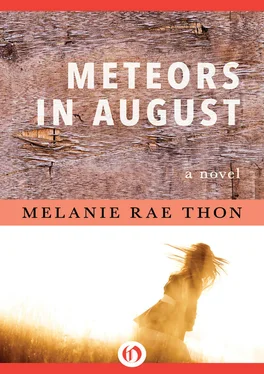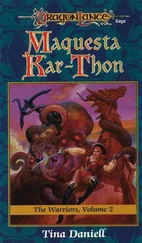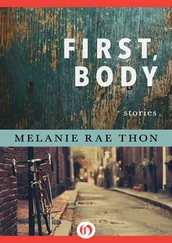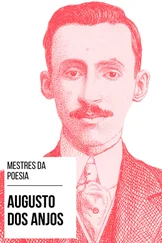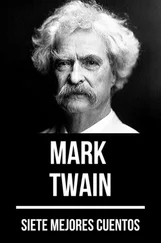Mom slipped her arm around Daddy’s waist. “I don’t want to kill him,” he whispered.
Arlen quieted herself, but her mouth still had that funny look.
Mother led Daddy to the living room and sat him down. “I don’t want to kill him,” he said again.
“Of course you don’t. Arlen doesn’t know what she’s saying.”
“I did at first, him and the boy too, but it wouldn’t change anything, would it?”
“Not now,” Mom said, rubbing his red hands.
I glanced at Arlen. She wasn’t paying any attention to my parents. She was crying as she chopped the onions.
We never ate dinner that night. I hid in my room, but around nine I got so hungry I had to sneak downstairs and grab a bowl of stew. Arlen sat in the kitchen with the lights off. “Close your eyes,” I said. But she didn’t, and she blinked hard in the sudden glare of the overhead light.
“Did you eat?” I said.
“I don’t remember.”
I looked in the sink: there were no dirty dishes. The drainer was empty. “I don’t think you did.” I dished up a bowl of stew for each of us. The stew was lukewarm and unseasoned, but I was hungry and shoveled it down. Arlen took three bites and stopped.
“What does he look like?” I said.
“Who?”
“Red Elk.” I wanted to know this man if I ever met up with him on the street. Aunt Arlen looked at me as if she were going to start hooting again. “Don’t you know, honey? Don’t you know?” I shook my head. “Then you must be the only one in town who doesn’t.” She leaned close to me. “Like an Indian,” she said, “he looks like a goddamned Indian.”
“I know that .”
“No, I mean a real Indian — big and dark, no white blood, still wears his hair in a braid down the back, still wears a blanket instead of a coat, still pisses in a hole in the ground.” I wondered how she knew. Arlen cocked her head. “Listen,” she said. I didn’t hear anything. “They’ve been at it all night.”
“Who?”
“Your parents.” She clamped her hands over her ears. “How can they?” The sounds of imagined lovemaking echoed in her head. Grandmother’s room was above us, and that room had been dead quiet a long time. “I can’t stand it,” Arlen said. “I can’t listen to that.” She pushed her chair back and let it fall, ran through the living room to her dark den where she was safe from voices, dreamed or real.
I turned out the lights, moved to Arlen’s place and finished her stew.
I couldn’t sleep that night. I was thinking about the night nearly seven years before when my father and his gang had chased Red Elk up the mountain. I could almost hear the joyful barks of the dogs as they caught the Indian’s scent.
I stood at the window, my nose touching the cold glass. A new moon cut the hard winter sky. I imagined how tired Red Elk must have been. Perhaps all he’d wanted to do that night was to lie on the cool rocks of the mountain. If it had only been the dogs on his tail, he might have given up. But Red Elk knew the men were close behind, so he kept climbing.
The dogs grew weary and took the men in a circle. Those dogs never made it off the mountain, and Mother told me and Nina what the men had done.
Later we heard how Red Elk went home that night and sat with a rifle across his lap. He hadn’t bothered to wipe his bloody nose or change his clothes.
Mary Louise Furey told him she wanted him out of there before Billy woke up. No boy of hers was going to see his daddy like that. She let Ike Turner know she’d made the man leave. She said she pulled the gun off his lap and threatened to shoot off his toes.
“They didn’t catch him,” Mary Louise said, “but they killed him all the same.” She talked to Ike because she knew he was the only man in town who wouldn’t be glad the Indian was gone. And she knew Ike couldn’t keep a secret. She wanted folks to believe that Red Elk had left her. She was tired of his kind of trouble.
Just before dawn the day the Indian disappeared, Mary Louise Furey heard ten shots. By the time she got out of bed, Red Elk had vanished and there were holes in the porch, one for each toe, a perfect outline. “He must’ve come damn close,” Mary Louise told Ike.
It was strange that the woman was the one to make him go. Red Elk could hold his own against any white man, but the white woman he loved made him hide out for seven years. I didn’t understand why Mary Louise blamed him for the sorrow my father and his friends had caused.
I was cold, standing there by the window, so I went back to bed, but I still couldn’t keep my eyes closed. I was remembering my father at church the morning after he’d tried to run the Indian out of town. I saw Nina skipping up beside him as we walked home, Nina who could forget so easily, Nina who didn’t know enough to be afraid of our father that day. And I saw my mother and myself behind them, looking at Daddy’s back, seeing him exactly as he was.
STORIES SPREAD about the way Red Elk got his wife to take him back. Mary Louise Furey told Ike Turner she’d been finding gifts on her porch and tracks in the snow for several weeks. There were three skinned rabbits with their eyes gouged out, a venison rump roast, and a string of sausages hanging in front of her door.
Ike Turner was proud of the fact that he was the first person in town to see Red Elk — besides Mary Louise, of course. Every customer who stopped in at the truck stop that day heard about Ike’s conversation with the Indian.
He offered Red Elk a job pumping gas, but the man told him working the pumps was a boy’s job, and Mary Louise would never stand for it. “I might as well go back to the reservation as come home smelling like gasoline every night,” Red Elk said. Ike Turner understood; Mary Louise Furey was no easy woman to please. But when he found out Red Elk meant to go back to the mill, Ike Turner said he wished he believed in God so he could say a prayer for his friend.
The day after Joshua Holler gave Red Elk a job, Daddy didn’t come home from work. At seven, Mother called me and Arlen to dinner. Nobody said a word until Arlen blurted, “He’s done it. He’s gotten into it with the big Indian. He’s drinking himself blind or digging himself into a hole to die.”
“Shut up, Arlen,” Mom said. “Shut your goddamn mouth.”
Arlen straightened her back and sat stone-still, holding her breath, waiting for the ill wind to pass. Finally she dabbed both sides of her mouth with her napkin, said “Very well,” and waltzed her way out of the kitchen. A moment later Mother got up too, bundled herself in an oversized coat, and slipped out front to sit on the porch swing.
From my bedroom above the porch, I watched the road. When I cracked the window open, I heard the whine of the swing, my mother rocking — rocking slowly to make time pass more slowly. I felt her fear: a stiffness in my joints like old age springing suddenly upon me, and I lay like a shell across my bed, unable to move.
I tried not to think about what might have happened to my father, but I imagined him changing his mind, deciding he wanted Red Elk dead after all. He might have rounded up his old gang, Dwight Carson and the mangy Foot brothers. Perhaps the men waited for the Indian after work. They might jump him in the parking lot, pull a garbage bag over his head and tie it at the knees, heave him into the bed of a pickup and head for the frozen lake. I wondered if my mother was troubled by the same visions.
An hour passed, and still Mother sat outside in the cold, waiting for the moment of my father’s return. Somehow I knew he was near; I felt him just as I felt her. I crawled over my bed to the window. A car whizzed by, but the lights were too low, too close to the ground for me to mistake it for my father’s truck. Then I saw him at the end of the block, on foot, lurching against a light swirl of snow.
Читать дальше
